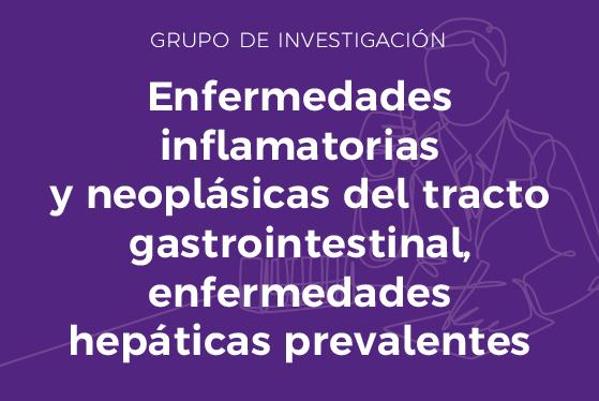Enfermedades inflamatorias y neoplásicas del tracto gastrointestinal, enfermedades hepáticas prevalentes
ENGASTRO


Hospital Universitario de Canarias
San Cristóbal de La Laguna, EspañaPublicacións en colaboración con investigadores/as de Hospital Universitario de Canarias (213)
2024
-
Agreement between the perception of colon cleansing reported by patients and colon cleansing assessed by a validated colon cleansing scale
Gastroenterologia y Hepatologia, Vol. 47, Núm. 2, pp. 130-139
-
Comparative Study of Predictive Models for the Detection of Patients at High Risk of Inadequate Colonic Cleansing
Journal of Personalized Medicine, Vol. 14, Núm. 1
-
Cost-effectiveness Analysis of Single-Use Duodenoscope Applied to Endoscopic Retrograde Cholangiopancreatography
Pancreas, Vol. 53, Núm. 4, pp. E357-E367
-
Design and validation of an artificial intelligence system to detect the quality of colon cleansing before colonoscopy
Gastroenterologia y Hepatologia
-
Longitudinal outcomes of obeticholic acid therapy in ursodiol-nonresponsive primary biliary cholangitis: Stratifying the impact of add-on fibrates in real-world practice
Alimentary Pharmacology and Therapeutics
-
Postcolonoscopy colorectal cancer: Prevalence, categorization and root-cause analysis based on the World Endoscopic Organization system
Gastroenterologia y Hepatologia, Vol. 47, Núm. 4, pp. 319-326
-
Predicting survival in patients with ‘non-high-risk’ acute variceal bleeding receiving β-blockers+ligation to prevent re-bleeding
Journal of Hepatology, Vol. 80, Núm. 1, pp. 73-81
-
Real-life effectiveness of sofosbuvir/velpatasvir/voxilaprevir in hepatitis C patients previously treated with sofosbuvir/velpatasvir or glecaprevir/pibrentasvir
Alimentary Pharmacology and Therapeutics
-
The Efficiency of Increased HCV Testing and Treatment Strategies in Spain to Achieve Elimination Goals
PharmacoEconomics - Open, Vol. 8, Núm. 2, pp. 221-233
-
The biochemical pattern defines MASLD phenotypes linked to distinct histology and prognosis
Journal of Gastroenterology
2023
-
A slowdown of hepatitis C diagnosis in high-prevalence groups and with decentralized diagnostic strategies during the COVID-19 pandemic
Revista espanola de enfermedades digestivas, Vol. 115, Núm. 4, pp. 175-180
-
Alcohol-related liver disease phenotype impacts survival after an acute variceal bleeding episode
Liver International, Vol. 43, Núm. 7, pp. 1548-1557
-
Artificial Intelligence Applied to Colonoscopy: Is It Time to Take a Step Forward?
Cancers, Vol. 15, Núm. 8
-
Asynchronous electronic consultation between primary care and specialized care proved effective for continuum of care for viraemic hepatitis C patients
Gastroenterologia y Hepatologia, Vol. 46, Núm. 4, pp. 266-273
-
Budesonide as first-line treatment in patients with autoimmune hepatitis seems inferior to standard predniso(lo)ne administration
Hepatology, Vol. 77, Núm. 4, pp. 1095-1105
-
COVID-19 vaccination rate and willingness of an additional dose among inflammatory bowel disease patients receiving biologic therapy: Fearless and with desire
Gastroenterologia y Hepatologia, Vol. 46, Núm. 4, pp. 255-260
-
Colon Bowel Preparation in the Era of Artificial Intelligence: Is There Potential for Enhancing Colon Bowel Cleansing?
Medicina (Lithuania), Vol. 59, Núm. 10
-
Decaying kidney function during cirrhosis correlates with remodeling of distal colon aldosterone target gene expression
American journal of physiology. Gastrointestinal and liver physiology, Vol. 325, Núm. 4, pp. G306-G317
-
Definition of a therapeutic range for predicting long-term infliximab response in patients with inflammatory bowel disease
Medicina Clinica, Vol. 160, Núm. 3, pp. 107-112
-
Efficacy, Efficiency, and Acceptability of Telemedicine for Inflammatory Bowel Disease Patients' Follow-Up Care during the COVID-19 Pandemic
Digestive Diseases, Vol. 41, Núm. 4, pp. 574-580